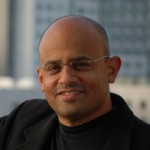Ethics and the Making of Cities
Date/Time
Date(s) - 11/20/2009
6:00 pm
Location
Simmons Hall (W79) - MPR, (229 Vassar Street, Cambridge MA)
Categories No Categories
 Dr. Aseem Inam has practiced as an architect, urban designer and planner in Los Angeles, Montreal, Mumbai, New Delhi, Paris, St. Louis, and Washington DC. Most recently, he led multidisciplinary teams on urbanist initiatives in the Caribbean, California, and on the U.S.-Mexico border. Early in his career, he created and lead the rural habitat development program in Gujarat, India. His essay, Meaningful Urban Design, received an Honorable Mention for the best writing on the future of American urbanism and was published in the Journal of Urban Design, and his book, Planning for the Unplanned: Recovering from Crises in Megacities, was published by Routledge, New York in 2005. In 2009 at MIT, he received the Excellence in Teaching Award in the Department of Urban Studies and Planning, and was selected as an inaugural Fellow at the Dalai Lama Center for Ethics and Transformative Values.
Dr. Aseem Inam has practiced as an architect, urban designer and planner in Los Angeles, Montreal, Mumbai, New Delhi, Paris, St. Louis, and Washington DC. Most recently, he led multidisciplinary teams on urbanist initiatives in the Caribbean, California, and on the U.S.-Mexico border. Early in his career, he created and lead the rural habitat development program in Gujarat, India. His essay, Meaningful Urban Design, received an Honorable Mention for the best writing on the future of American urbanism and was published in the Journal of Urban Design, and his book, Planning for the Unplanned: Recovering from Crises in Megacities, was published by Routledge, New York in 2005. In 2009 at MIT, he received the Excellence in Teaching Award in the Department of Urban Studies and Planning, and was selected as an inaugural Fellow at the Dalai Lama Center for Ethics and Transformative Values.
The talk is co-sponsored by the Residential Scholars Program at Simmons Hall and the Dalai Lama Center for Ethics and Transformative Values, and is supported by a generous contribution from the William R. (1956) and Betsy P. Leitch Endowment.
Drawing from the work of American pragmatist philosophers Charles Peirce, William James, John Dewey, and Richard Rorty, the talk outlines a conceptual shift to render the practice of urbanism more relevant and effective in the face of critical urban challenges. The shift consists of viewing the city as flux rather than just as object, focusing on consequences rather than just intentions, and design as a creative political act rather than just a form-making exercise. The talk illustrates the conceptual shift with case studies of the author’s experiments in urbanism in professional practice and pedagogy. In order to make a meaningful difference in the city, urbanists have to view their creative practices as driven by moral choices and consequential impacts.

